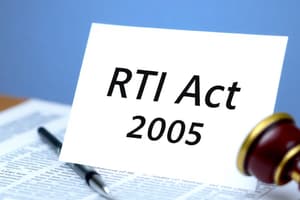Podcast
Questions and Answers
Which section of the Right to Information Act, 2005, outlines the obligations of public authorities regarding transparency and information dissemination?
Which section of the Right to Information Act, 2005, outlines the obligations of public authorities regarding transparency and information dissemination?
- Section 6
- Section 19
- Section 4 (correct)
- Section 8
An individual seeks information under the RTI Act, 2005. Which section specifies the procedure they must follow to obtain this information from a Public Information Officer (PIO)?
An individual seeks information under the RTI Act, 2005. Which section specifies the procedure they must follow to obtain this information from a Public Information Officer (PIO)?
- Section 8
- Section 6 (correct)
- Section 4
- Section 7
A government department denies a request for information, citing confidentiality. Which section of the Right to Information Act, 2005, allows for exemption from disclosing certain information?
A government department denies a request for information, citing confidentiality. Which section of the Right to Information Act, 2005, allows for exemption from disclosing certain information?
- Section 8 (correct)
- Section 7
- Section 5
- Section 11
A PIO receives a request concerning information held by a third party. Which section of the Right to Information Act, 2005, outlines the procedure for dealing with such information?
A PIO receives a request concerning information held by a third party. Which section of the Right to Information Act, 2005, outlines the procedure for dealing with such information?
As per the Right to Information Act, 2005, which section establishes the framework for constituting the Central Information Commission (CIC), the apex body for hearing appeals?
As per the Right to Information Act, 2005, which section establishes the framework for constituting the Central Information Commission (CIC), the apex body for hearing appeals?
Under the Right to Information Act, 2005, what section deals with the establishment and composition of the State Information Commission (SIC)?
Under the Right to Information Act, 2005, what section deals with the establishment and composition of the State Information Commission (SIC)?
An applicant is unsatisfied with the response from the PIO. According to the RTI Act, 2005, which section describes the process for filing an appeal against the PIO's decision?
An applicant is unsatisfied with the response from the PIO. According to the RTI Act, 2005, which section describes the process for filing an appeal against the PIO's decision?
A Public Information Officer (PIO) fails to provide information within the statutory time frame. As per the Right to Information Act, 2005, which section specifies the penalties that can be imposed on the PIO?
A Public Information Officer (PIO) fails to provide information within the statutory time frame. As per the Right to Information Act, 2005, which section specifies the penalties that can be imposed on the PIO?
Which section of the Right to Information Act, 2005, addresses the concept of 'good faith' protection for actions taken by officials under this Act?
Which section of the Right to Information Act, 2005, addresses the concept of 'good faith' protection for actions taken by officials under this Act?
The Right to Information Act, 2005 has an overriding effect on other laws. Which section establishes this principle?
The Right to Information Act, 2005 has an overriding effect on other laws. Which section establishes this principle?
Section 9 of the Right to Information Act, 2005, allows a PIO to reject a request under specific cicrumstances. Which of the following circumstances aligns with such rejections?
Section 9 of the Right to Information Act, 2005, allows a PIO to reject a request under specific cicrumstances. Which of the following circumstances aligns with such rejections?
As per the RTI Act, 2005, the severability clause ensures that even if part of the requested information is exempt from disclosure, the rest can still be provided. Which section deals with this?
As per the RTI Act, 2005, the severability clause ensures that even if part of the requested information is exempt from disclosure, the rest can still be provided. Which section deals with this?
The Right to Information Act, 2005, came into force on which of the following dates, marking a significant milestone in promoting transparency and accountability?
The Right to Information Act, 2005, came into force on which of the following dates, marking a significant milestone in promoting transparency and accountability?
What is the standard tenure for the Chief Information Commissioner (CIC) under the Right to Information Act, 2005, reflecting the term length designed to ensure stability and independence in the role?
What is the standard tenure for the Chief Information Commissioner (CIC) under the Right to Information Act, 2005, reflecting the term length designed to ensure stability and independence in the role?
Under the Right to Information Act, 2005, what is the prescribed time limit for a Public Information Officer (PIO) to furnish the requested information to an applicant, ensuring timely access to information?
Under the Right to Information Act, 2005, what is the prescribed time limit for a Public Information Officer (PIO) to furnish the requested information to an applicant, ensuring timely access to information?
If an RTI application pertains to information concerning the life or liberty of a person, within what expedited timeframe must the Public Information Officer (PIO) provide the information?
If an RTI application pertains to information concerning the life or liberty of a person, within what expedited timeframe must the Public Information Officer (PIO) provide the information?
What is the maximum penalty that can be imposed on a Public Information Officer (PIO) under the RTI Act, 2005, for failing to provide information or for providing incorrect or misleading information?
What is the maximum penalty that can be imposed on a Public Information Officer (PIO) under the RTI Act, 2005, for failing to provide information or for providing incorrect or misleading information?
According to the Right to Information Act, 2005, what is the daily penalty rate that can be levied on a Public Information Officer (PIO) who delays providing information beyond the stipulated time frame?
According to the Right to Information Act, 2005, what is the daily penalty rate that can be levied on a Public Information Officer (PIO) who delays providing information beyond the stipulated time frame?
Under the Right to Information Act, 2005, what is the timeframe within which a Public Information Officer (PIO) must transfer an RTI application to another public authority if the subject matter of the application pertains to that other authority?
Under the Right to Information Act, 2005, what is the timeframe within which a Public Information Officer (PIO) must transfer an RTI application to another public authority if the subject matter of the application pertains to that other authority?
In cases where a third party is involved in the information requested under the RTI Act, 2005, what is the time limit granted to the third party to present their case or objections to the Public Information Officer (PIO) regarding the disclosure of such information?
In cases where a third party is involved in the information requested under the RTI Act, 2005, what is the time limit granted to the third party to present their case or objections to the Public Information Officer (PIO) regarding the disclosure of such information?
According to the Right to Information Act, 2005, what is the time limit for the first appellate authority to issue an order on an appeal filed under the Act, ensuring a swift resolution process?
According to the Right to Information Act, 2005, what is the time limit for the first appellate authority to issue an order on an appeal filed under the Act, ensuring a swift resolution process?
Under the Right to Information Act, 2005, if an applicant is not satisfied with the decision of the first appellate authority, within what period can they file a second appeal before the Central Information Commission (CIC) or the State Information Commission (SIC)?
Under the Right to Information Act, 2005, if an applicant is not satisfied with the decision of the first appellate authority, within what period can they file a second appeal before the Central Information Commission (CIC) or the State Information Commission (SIC)?
When a Public Information Officer (PIO) receives an RTI application that involves a third party, what is the extended time limit for the PIO to provide the information, considering the need for third-party consultation?
When a Public Information Officer (PIO) receives an RTI application that involves a third party, what is the extended time limit for the PIO to provide the information, considering the need for third-party consultation?
As per the RTI Act, 2005, what is the time frame within which an applicant can submit the first appeal from either the receipt of the PIO's response or from the date when the response should have been received, if no response was provided?
As per the RTI Act, 2005, what is the time frame within which an applicant can submit the first appeal from either the receipt of the PIO's response or from the date when the response should have been received, if no response was provided?
How long does the first appellate authority have to pass an order on the appeal if reasons for the delay are provided?
How long does the first appellate authority have to pass an order on the appeal if reasons for the delay are provided?
What is the stipulated timeframe, according to the RTI Act, 2005, for issuing a notice to a third party after receiving an RTI application that involves information related to them, facilitating their right to be heard?
What is the stipulated timeframe, according to the RTI Act, 2005, for issuing a notice to a third party after receiving an RTI application that involves information related to them, facilitating their right to be heard?
If an RTI application is filed through an Assistant Public Information Officer (APIO), what is the overall time limit for the PIO to provide the information to the applicant, factoring in the additional time for processing?
If an RTI application is filed through an Assistant Public Information Officer (APIO), what is the overall time limit for the PIO to provide the information to the applicant, factoring in the additional time for processing?
What is the mandatory timeframe for the PIO to furnish information if the application is forwarded to another public authority for compliance?
What is the mandatory timeframe for the PIO to furnish information if the application is forwarded to another public authority for compliance?
As per the RTI Act, 2005, what is the prescribed timeline for the PIO to disseminate information is the application in question requires a consult from a third property and subsequently is rejected?
As per the RTI Act, 2005, what is the prescribed timeline for the PIO to disseminate information is the application in question requires a consult from a third property and subsequently is rejected?
What is the time limit, according to the RTI Act, 2005, for the first appellate authority to decide on an appeal if no reasons for delay are given in writing?
What is the time limit, according to the RTI Act, 2005, for the first appellate authority to decide on an appeal if no reasons for delay are given in writing?
If a public authority, upon receiving an RTI application, realizes it’s not the custodian of the requested information, how much time does it have to transfer the application to the appropriate authority?
If a public authority, upon receiving an RTI application, realizes it’s not the custodian of the requested information, how much time does it have to transfer the application to the appropriate authority?
As stated per the RTI Act, how many days does a POI have to furnish information is the data sought affects or relates to allegations of human rights violations?
As stated per the RTI Act, how many days does a POI have to furnish information is the data sought affects or relates to allegations of human rights violations?
If an application concerns allegations of corruption from excluded organizations per the RTI Act, what is the turnaround time?
If an application concerns allegations of corruption from excluded organizations per the RTI Act, what is the turnaround time?
If a PIO recieves an RTI and its not the POI who has the data - instead, it gets transferred to the correct authority, what is the timeline for the reply to be issued?
If a PIO recieves an RTI and its not the POI who has the data - instead, it gets transferred to the correct authority, what is the timeline for the reply to be issued?
According to the rules, if a public authority is NOT the data custodian for some RTI inquiry, plus there is a third party envolved, what is to timeline for the POI to reply?
According to the rules, if a public authority is NOT the data custodian for some RTI inquiry, plus there is a third party envolved, what is to timeline for the POI to reply?
When an RTI inquiry needs the POI to direct the inquiry to another authority, plus there is a question of life or human liberty envolved, what is the timeline?
When an RTI inquiry needs the POI to direct the inquiry to another authority, plus there is a question of life or human liberty envolved, what is the timeline?
Flashcards
Section 4
Section 4
Deals with obligations of public authorities under the RTI Act.
Section 6
Section 6
Specifies the procedure for requesting information.
Section 8
Section 8
Specifies exemptions from disclosure of information.
Section 11
Section 11
Signup and view all the flashcards
Section 12
Section 12
Signup and view all the flashcards
Section 15
Section 15
Signup and view all the flashcards
Section 19
Section 19
Signup and view all the flashcards
Section 20
Section 20
Signup and view all the flashcards
Section 21
Section 21
Signup and view all the flashcards
Section 22
Section 22
Signup and view all the flashcards
Section 24
Section 24
Signup and view all the flashcards
Section 7
Section 7
Signup and view all the flashcards
Time to Reply
Time to Reply
Signup and view all the flashcards
Life or Liberty Info Time
Life or Liberty Info Time
Signup and view all the flashcards
Maximum Penalty Amount
Maximum Penalty Amount
Signup and view all the flashcards
Daily Penalty Rate
Daily Penalty Rate
Signup and view all the flashcards
First Appeal Time Limit
First Appeal Time Limit
Signup and view all the flashcards
Appeal Order Time (No Delay Reason)
Appeal Order Time (No Delay Reason)
Signup and view all the flashcards
Appellate Order Time Limit
Appellate Order Time Limit
Signup and view all the flashcards
RTI Transfer Time
RTI Transfer Time
Signup and view all the flashcards
Third Party Representation Time
Third Party Representation Time
Signup and view all the flashcards
Reply Time (Third Party)
Reply Time (Third Party)
Signup and view all the flashcards
Second Appeal Time Limit
Second Appeal Time Limit
Signup and view all the flashcards
RTI Act Effective Date
RTI Act Effective Date
Signup and view all the flashcards
CIC Tenure Length
CIC Tenure Length
Signup and view all the flashcards
PIO notice of time
PIO notice of time
Signup and view all the flashcards
Decision time limit of the CIC or SIC
Decision time limit of the CIC or SIC
Signup and view all the flashcards
Time limit PIO
Time limit PIO
Signup and view all the flashcards
Time limit PIO to provide the information
Time limit PIO to provide the information
Signup and view all the flashcards
Provide time
Provide time
Signup and view all the flashcards
Study Notes
Right to Information Act, 2005: Key Sections and Provisions
- Section 4 pertains to the obligations of public authorities.
- Section 5 concerns the appointment of Public Information Officers (PIOs).
- Section 6 outlines the procedure for obtaining information.
- Section 7 specifies the time limit for providing information.
- Section 8 deals with exemptions from disclosure of information.
- Section 9 provides grounds for the rejection of requests for information.
- Section 10 addresses the severability of information.
- Section 11 discusses procedures related to third-party information.
- Section 12 deals with the constitution of the Central Information Commission.
- Section 15 concerns the constitution of the State Information Commission.
- Section 18 outlines the powers and functions of the Information Commissions.
- Section 19 provides the appeal process.
- Section 20 deals with penalties for failure to provide information.
- Section 21 protects actions taken in good faith.
- Section 22 describes the overriding effect of the Act.
- Section 23 concerns the jurisdiction of courts.
- Section 24 pertains to certain organizations.
Time Limits for Providing Information
- A PIO must reply to an RTI application within 30 days.
- If the application is received through an Assistant Public Information Officer (APIO), the time limit is 35 days.
- If the information concerns the life or liberty of a person, the PIO must provide the information within 48 hours.
- If a third party is involved, the PIO has 40 days to reply.
- If the application is transferred to another public authority, that PIO has 30 days from receipt of the application.
- For allegations of human rights violations from excluded organizations, information must be provided within 45 days.
- For allegations of corruption from excluded organizations, this period is 30 days.
- No time limit is specified for the Central Information Commission (CIC) or State Information Commission (SIC) to decide on a second appeal.
Penalties and Appeals
- The maximum penalty for a PIO failing to provide information, or providing incorrect, incomplete, or misleading information is Rs. 25,000.
- The daily penalty is Rs. 250 for each day the information is not provided.
- A third party has 10 days to make a representation to the PIO after receiving a notice regarding disclosure.
- The first appellate authority must pass an order on an appeal within 30 days, extendable to 45 days with reasons.
- An applicant can file a second appeal before the CIC or SIC within 90 days from the date of receipt of the first appeal order.
Transfer of Applications
- A PIO has 5 days to transfer an RTI application to another public authority if the information requested pertains to that authority.
Other Key Points
- The Right to Information Act, 2005, came into force on October 12, 2005.
- The tenure of the Chief Information Commissioner is 5 years.
Studying That Suits You
Use AI to generate personalized quizzes and flashcards to suit your learning preferences.



